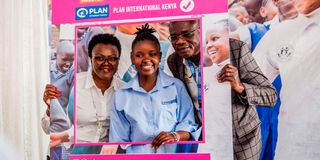The mentorship drive helping girls become CEOs

From left: Halima Abba Ali Zaid of Royal Danish Embassy; Florence Wangare girl rights advocate at Plan International Kenya, Alice Anukur Country Director Child Fund Kenya, and Plan International Kenya Country Director George Otim during the International Day of the Girl Celebrations at Methodist Ministries Centre, Nairobi, in October 2023.
What you need to know:
- The five-year initiative supports girls’ power, voices, and participation in leadership and pushing for their representation in decision-making organs.
- Among its main features is advocacy for rights and equality.
As the world celebrates the International Day of the Girl Child, Plan International has unveiled an initiative dubbed Girls Get Equal to mentor and empower young girls into leadership.
The five-year initiative is supporting girls’ power, voices, and participation in leadership and pushing for their representation in decision-making organs. Among its main features is the Girls Takeover, an advocacy drive for rights and equality that allow girls to temporarily run organisations as chief executives and country directors, guided by substantive office holders.
During Plan International’s celebrations to mark the day in Nairobi, Country Director George Otim said the takeovers mentor and empower girls and young women to lead.
“Takeovers present an opportunity for relevant and meaningful engagement, as a mentorship and professional development opportunity for young people. Giving girls these opportunities help prepare them into decision-making, and leadership positions and spaces,” Mr Otim said.
The initiative ensures a world where girls and young women are recognised and valued as drivers of change in their communities and beyond. Its objective is to change perceptions around what is possible for girls and young women as decision-makers, leaders and change-makers with support from Plan’s partners.
Beneficiaries
Florence Wangare, a peer educator with the Young Health Programme under Plan International in Mathare slums, Nairobi, was the lucky girl to take over the position of country director at the organisation for a day.
Florence was privileged to be involved in the country director’s schedule, held meetings with some staff members and learnt a lot about what happens when one is in the position.

From Left: Child Fund Kenya Country Director Alice Anukur, Girl Advocate at Plan International Kenya Florence Wangare and Plan International Kenya Country Director George Otim during the International Day of the Girl Celebrations at Methodist Ministries Centre, Nairobi, in October 2023.
“Girls takeover is a concept where girls are supported to take over leadership positions in different organisations. It gives girls like me an opportunity to get into the shoes of a leader and understand what it takes to be in such a position,” she said.
Florence said she never imagined she would get such an opportunity, adding it was an eye-opener for her, to believe that she can make it in life.
“Today I stand here as a testament that if girls are given an opportunity, they are equal to the task. I challenge you to give us opportunities and we shall not disappoint you,” she added.
Janet Dete, another girls’ advocate from Mathare, said the programme has been of help to girls from the informal settlement, many of whom are confronted by teenage pregnancy, lack of access to sexual reproductive health services and gender-based violence.
“Many girls in the slums do not know how to make informed choices for themselves. It is my belief that those who are closest to the problem have a solution to it,” she said.
Takeovers present an opportunity for relevant and meaningful engagement of leaders with young people. It also creates awareness among leaders of some of the issues affecting girls and helps in changing their attitudes so that they embrace girls’ capacity and potential for leadership.
Full potential
Alice Anukur, the country director of Child Fund Kenya, said every child should be allowed to realise their full potential. “Girls, in particular, need to know and get exposed to many opportunities that exist to have them empowered,” she said.
Besides the takeovers, the Girls Get Equal initiative is also pushing to have every girl and young woman have power over her own life and be able to shape the world around her. The campaign, supported and implemented by young people, is also fighting discrimination, harassment and violence and amplifying girls’ leadership and rights.
With this year’s International Day of the Girl Child theme being ‘Girls’ activism, accountability and resourcing,’ Plan International is calling on the government to support girls and young women to have regular access to decision-makers.
The organisation is also calling for the provision of quality education on gender equality, human rights and democratic governance to build girls’ understanding of activism. It is further urging skills training in organising and public speaking, to build confidence in girls’ ability to campaign and have influence on the topics they care about.



